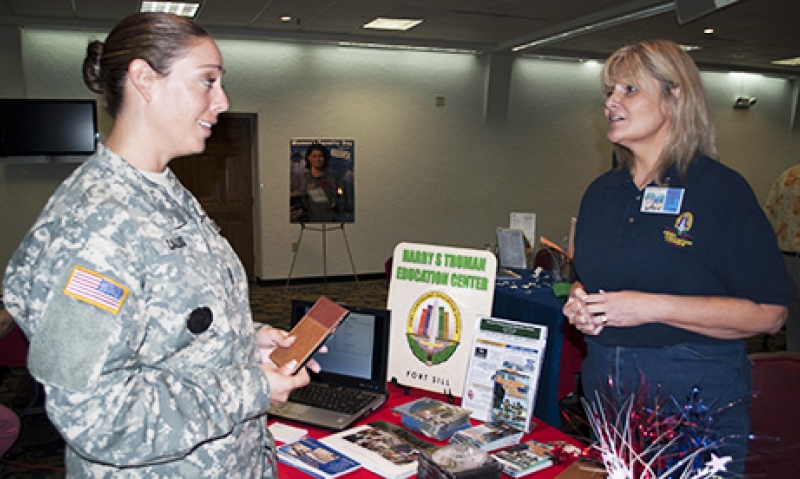
The U.S. House of Representatives has passed several bills that The American Legion has been pushing, including the Veterans Opportunity to Work Act.
The U.S. House of Representatives passed several pieces of American Legion-supported legislation on Oct. 11 and 12 that - if enacted by the Senate and signed by the president - will affect veterans and servicemembers. These bills were to provide job retraining for older veterans, to prevent sexual assault at VA medical facilities, to extend provisions of the Servicemembers Civil Relief Act (SCRA) to surviving spouses, and to address the improvement of training for workers at the Veterans Benefits Administration.
After American Legion National Commander Fang A. Wong urged Congress to "collaborate and bring your parties together to get a jobs bill for America's veterans passed," the House passed the Veterans Opportunity to Work (VOW) Act (H.R. 2433). The legislation directs the VA Secretary of Labor to provide veterans aged 35-60 with funding for up to 12 months of job retraining assistance. Veterans applying for the funding must be unemployed, have honorable discharges, and be ineligible for GI Bill education benefits.
The VOW Act would also extend the military's Transitional Assistance Program (TAP) to virtually all servicemembers. In congressional testimony last July, the Legion strongly supported the bill and told the House Veterans' Affairs Committee (HVAC) that TAP should be "mandatory for all servicemembers exiting the military," and that "this provision is essential to give all transitioning servicemembers the tools and resources they need to successfully integrate into the civilian workforce."
The jobless rate among veterans is currently 8.1 percent nationwide.
The Veterans Sexual Assault Prevention and Health Care Enhancement Act (H.R. 2074) directs the Secretary of Veterans Affairs to develop and implement a comprehensive policy for reporting and tracking sexual assaults at VA medical facilities. This includes surveillance cameras, panic alarms, clearly defined criteria for reporting sexual assaults, procedures for VA law enforcement officials to investigate such incidents, and clinical guidance for treating sexual assaults reported more than 72 hours after they occur.
Last June, The American Legion testified before the HVAC's Subcommittee on Health hearing, "Preventing Sexual Assaults and Safety Incidents at U.S. Department of Veterans Affairs Facilities."
"There are veterans who do not feel safe using the facilities provided for them for health care, and they don't feel safe for a reason," the Legion testified. In the last three years alone, nearly 300 incidents of sexual assault were reported to the VA police. Staggeringly, the vast majority of these incidents were not reported to VA leadership and/or the Office of the Inspector General.
Noting that VA already had regulations and policies in place to counter unwanted sexual advances, the Legion said "it is abundantly clear these policies are not being consistently enforced, if enforced at all. Actions speak louder and more convincingly than words. VA's actions must show their commitment to a policy geared towards ending the sexual assaults and other security incidents."
Another bill passed by the House, H.R. 1263, would give surviving spouses the same protections afforded to servicemembers under the SCRA. These include prohibitions against the sale, foreclosure and seizure of property if the spouses "are unable to meet an obligation on real or personal property."
Testifying last July before the HVAC's Subcommittee on Economic Opportunity, The American Legion urged Congress to extend SCRA protections to spouses, saying that military families "serve our country with pride, honor and quiet dedication. We know that every member of a military family sacrifices just as much for this country."
Reminding the subcommittee that spouses of deceased servicemembers have no mortgage protections, the Legion said that "leaving grieving families vulnerable to losing their home and being put on the streets" could be avoided by extending mortgage foreclosure protection to surviving spouses.
The Veterans' Benefits Act (H.R. 2349) - previously titled the Veterans' Benefits Training Improvement Act - directs the VA Secretary to annually assess the skills of workers who process benefits claims and implement training plans related to those skills. If VA finds an employee's skills to be deficient, then it would "take appropriate disciplinary actions with respect to individuals failing to receive a satisfactory result after being given two opportunities for ... remediation."
The American Legion told the HVAC's Subcommittee on Disability and Memorial Affairs last July that "veterans and veterans alone bear the lion's share of consequences from faulty decision-making. This is fundamentally unfair in a system ostensibly designed to compensate them ...."
While the Legion supported H.R. 2349, it also noted that VA already had a skills-testing program "and perhaps the real question is a lack of enforcement or consequences for testing already in place.
"As The American Legion has previously stated on numerous occasions, there is a fundamental flaw in (the) error reporting system in that it does not have a mechanism to direct training. If there is to be testing of skills, this also should naturally flow into directing a training mechanism."
- Legislative

